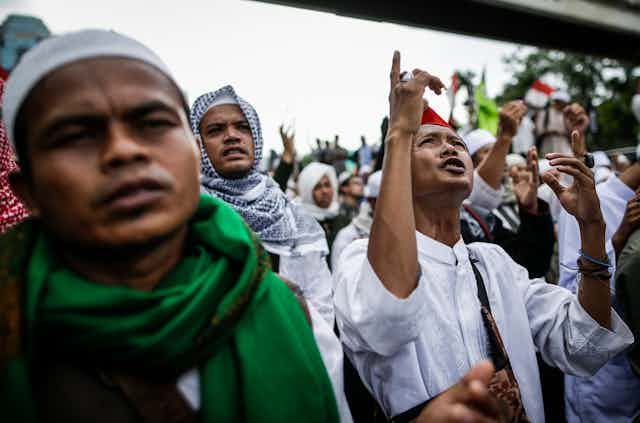Moving away from their past ambiguous stance on violent Islamic extremism, Indonesian conservative Muslim organisations are taking a more assertive position against terrorism under the current government.
For many years, organisations such as the Islamic Defenders Front (FPI), Hizbut Tahrir Indonesia (HTI), National Movement to Safeguard Indonesian Ulema Council’s Edicts (GNPF-MUI) and Muslim Peoples Forum (FUI) have been associated with religious intolerance and violence. Now they are openly rejecting terrorism.
I argue that the change is part of conservative groups’ strategy to ensure their survival amid increasing pressure against extremist discourse and activities.
The history
FPI, founded a couple of months after the fall of the Soeharto regime in 1998, is notorious for its violent vigilante acts.
Allegedly supported by Indonesian security forces, in its early years it organised raids against bars and nightclubs and overtly campaigned to prosecute religious minority groups.
FUI is a coalition of Islamic organisations, including FPI. In 2008, they were involved in an attack on a rally in Jakarta for the rights of religious minority group Ahmadiyah.
HTI, the Indonesian branch of an international organisation that aims to revive a global Islamic caliphate, is opposed to violent tactics. But they spread hate-mongering rhetoric against religious minorities.
The political shift
Following the fall of Soeharto, conservative Muslim organisations could operate under the breeze of a new democracy that promoted freedom of speech.
Under Susilo Bambang Yudhoyono’s administration, conservative Muslims were given more clout.
In 2005, he told the national congress of the Ulema Council that the state wanted “to place [the council] in a central role in matters regarding the Islamic faith”. He also legitimised religious violence by releasing measures against “deviant beliefs”.
However, things have changed under the current administration.
President Joko “Jokowi” Widodo has identified intoleransi as one of Indonesia’s main problems. He has adopted an authoritarian approach in response.
Last year, the government issued a law that allows the government to disband organisations it deems not aligned to the state ideology Pancasila, which supports pluralism. HTI was the first victim of the law.
The political shift has forced conservative Muslim groups to adjust their image and actions – not only to gain public support but also to avoid being banned.
The clash, now and then
The political change has in particular forced the conservative groups to alter their stance towards terrorism.
I monitor these changes from Muslim conservative publications like www.eramuslim.com, www.muslimdaily.net, www.belaquran.com and www.hidayatullah.com.
The changes are evident before and after Jokowi’s presidency.
Before Jokowi
After the first Bali bombing in 2002, FPI founder Habib Rizieq Shihab resorted to a conspiracy theory. He claimed that the United States engineered the attack to create an image of Indonesia as a “terrorist haven”.
HTI claimed the attacks were engineered to stigmatise Muslims. They came to that conclusion knowing that not a single terrorist attack managed to take down US government establishments.
Similar to HTI, FUI believed that the discourse of the “war on terrorism” was no more than a declaration of war against Muslims.
These groups also glorified the perpetrators of terrorist attacks.
When the terrorists behind the first Bali bombing, Amrozi, Muklas and Imam Samudra, were executed in 2008, FPI and FUI declared that they were warriors or mujahid who had died defending Islam (syahid).
FUI secretary-general Muhammad Al-Khaththath described the terrorists as jihadists and said the spirit of their actions needed to be taught to Muslims in Indonesia.
FPI and FUI also took a vague stance on Islamic State (IS).
In their official statement, both organisations underlined their support for the establishment of an Islamic state (khilafah Islamiyah) even though they were reluctant to show explicit support for IS.
FUI refused to condemn IS, arguing that growing support for IS in Indonesia was just “a form of regular admiration”.
After Jokowi
In the years since Jokowi came to office, the conservative Muslim organisations seem to be distancing themselves from groups with extreme ideology to create a more peaceful image.
Their recent statements emphasise that the terrorists have deviated from Islamic teachings. Their statements also argue for the importance of maintaining national unity.
After a bomb attack in Kampung Melayu, East Jakarta, in 2017, GNPF-MUI chairman Bachtiar Nasir called it “an act that violates Islamic laws (sharia) and Indonesian Muslims’ consensus”.
The previous year, FPI condemned the terrorist attacks in Jakarta as “serious crimes”.
Responding to the terrorist attacks in Surabaya, East Java, in the past week, FPI stressed that “no religion teaches its followers to kill others”.
GNPF chairman Bachtiar Nasir issued a similar statement, saying the attacks “smeared our peaceful Islam that promoted unity and brotherhood”. He said Muslims and people of other faiths should work to preserve national unity.
Image-building strategy
The change in attitude on terrorism is understandable. Being perceived by the public to be supporting violent extremism will make these groups’ position politically fragile.
Additionally, being associated with extremism can provide justification for the government to disband these organisations, as happened to HTI. This will leave their goals to establish a nation ruled by Islamic values in shambles.
Under the current political system, being ambiguous towards terrorist attacks will not help conservative groups create an image that Muslim conservatives stand for peace and national unity.
Therefore, the change in the attitude of Muslim conservative groups towards terrorism is not ideological. It’s a strategic move to survive in Indonesia’s current political landscape.


